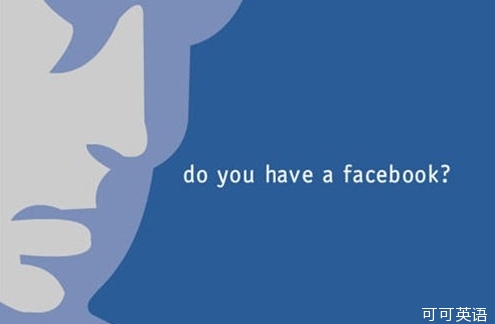(单词翻译:单击)
Facebook is bad for you
Facebook对你没好处
Get a life!
回到现实中过日子吧!
Using the social network seems to make people more miserable
使用Facebook这种社交网站看起来让人们更加痛苦
Aug 17th 2013 |From the print edition

THOSE who have resisted the urge to join Facebook will surely feel vindicated when they read the latest research. A study just published by the Public Library of Science, conducted by Ethan Kross of the University of Michigan and Philippe Verduyn of Leuven University in Belgium, has shown that the more someone uses Facebook, the less satisfied he is with life.
那些坚决不加入Facebook的人们读到最新的研究的时候肯定会觉得他们的选择是对的。刚刚发表在《公共科学图书馆》上的一份研究显示,一个人使用Facebook越频繁,他对生活就越不满意,这份研究是由美国密歇根大学的Ethan Kross和比利时鲁汶大学的Philippe Verduyn领导进行的。
Past investigations have found that using Facebook is associated with jealousy, social tension, isolation and depression. But these studies have all been “cross-sectional”—in other words, snapshots in time. As such, they risk confusing correlation with causation: perhaps those who spend more time on social media are more prone to negative emotions in the first place. The study conducted by Dr Kross and Dr Verduyn is the first to follow Facebook users for an extended period, to track how their emotions change.
过去的调查研究发现使用Facebook会滋生嫉妒,社交紧张,孤立和压抑等情绪。但是这些研究都是断面的,换句话说就是都是简要说明。这样的话,他们可能把原因与相关因素给混淆了。或许花费大量时间在社交媒体上面的人们本来就是比较悲观的人。而Kross博士和Verduyn博士指导的研究是第一个在一段时间内追踪一群Facebook使用者情绪变化的实验。
The researchers recruited 82 Facebookers for their study. These volunteers, in their late teens or early 20s, agreed to have their Facebook activity observed for two weeks and to report, five times a day, on their state of mind and their direct social contacts (phone calls and meetings in person with other people). These reports were prompted by text messages, sent between 10am and midnight, asking them to complete a short questionnaire.
研究人员征集了82名Facebook用户参与他们的研究。这些参与者年龄在二十岁左右。他们同意研究人员观察他们的Facebook活动两周,并且每天报告五次他们的心理状况和直接社交联系状况(比如电话和约会)。这些报告通过短信提示,短信发出时间为上午十点到晚上十二点之间,会要求参与者完成一份简短的问卷。
When the researchers analysed the results, they found that the more a volunteer used Facebook in the period between two questionnaires, the worse he reported feeling the next time he filled in a questionnaire. Volunteers were also asked to rate their satisfaction with life at the start and the end of the study. Those who used Facebook a lot were more likely to report a decline in satisfaction than those who visited the site infrequently. In contrast, there was a positive association between the amount of direct social contact a volunteer had and how positive he felt. In other words, the more volunteers socialised in the real world, the more positive they reported feeling the next time they filled in the questionnaire.
研究人员分析结果的时候发现在两份问卷间隔期使用Facebook越频繁的参与者,填写第二次问卷的时候情绪就越糟糕。在研究开始和结束时,参与者也被要求评价他们生活的满意度。较多使用Facebook的人比较少使用的人满意度下降明显。相反地,直接社交联系则会产生积极的影响。换句话说,参与者越多的参与真实的社交活动,他们下次填问卷的时候情绪就更积极。
A volunteer’s sex had no influence on these findings; nor did the size of his (or her) social network, his stated motivation for using Facebook, his level of loneliness or depression or his self-esteem. Dr Kross and Dr Verduyn therefore conclude that, rather than enhancing well-being, Facebook undermines it.
参与者的性别对研究结果没有影响,参与者社交圈的大小,其使用Facebook的动机,其孤独,抑郁或者自负的程度对结果都没有影响。Kross博士和Verduyn博士于是得出结论,Facebook降低了人们的幸福程度。
Their study does not tease out why socialising on Facebook has a different effect from socialising in person. But an earlier investigation, conducted by social scientists at Humboldt University and Darmstadt’s Technical University, both in Germany, may have found the root cause. These researchers, who presented their findings at a conference in Leipzig in February, surveyed 584 users of Facebook aged mostly in their 20s. They found that the most common emotion aroused by using Facebook is envy. Endlessly comparing themselves with peers who have doctored their photographs, amplified their achievements and plagiarised their bons mots can leave Facebook’s users more than a little green-eyed. Real-life encounters, by contrast, are more WYSIWYG (what you see is what you get).
他们的研究没有找出Facebook上的社交活动对不同人的社交活动影响的差异。但是更早的一份由德国的洪堡大学和达姆施塔特工业大学的社会科学家指导的调查研究发现的根本原因。这些研究人员二月份的时候在莱比锡的一个会议上展示了他们的研究结果。他们的实验对象为584名20多岁的Facebook使用者。他们发现使用Facebook最容易引起的情绪是嫉妒。无休止的与自己的同龄人做对比,看他们P过的照片,夸大自己的成就,剽窃别人的名言,这些都让Facebook的使用者心生嫉妒。比较而言,现实生活中的碰面则更真实。
What neither study proves is whether all this is true only for younger users of Facebook. Older ones may be more mellow, and thus less begrudging of their friends’ successes, counterfeit or real. Maybe.
这些研究都没有证实的是这些研究结果是不是只发生在年轻人身上。年龄稍大的人或许更加成熟,这样他们就不会太妒忌自己朋友的成功。是真是假都说不定。


